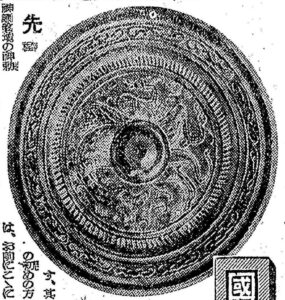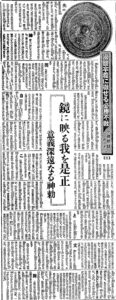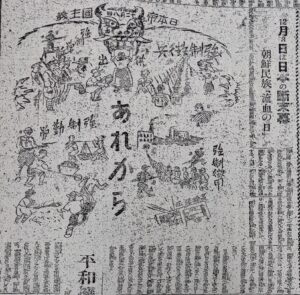This is the third and final part of Governor-General Koiso's February 1944 intensely religious address to the entire Korean nation, which was prominently displayed on the front page of Keijo Nippo, the most widely distributed and read newspaper in all of Korea at the time. In the first part of the address, he described all Koreans as descendants of the Shinto god Susanoo-no-mikoto, the younger brother of Amaterasu, the Sun Goddess, but as he wrapped up his address in this final part, Koiso insulted the Korean people by calling them liars, slackers, quitters, and thieves, placing blame on the legacy of the corrupt Yi Dynasty. He then offered the Korean people a chance to redeem themselves and become honorable people by submitting themselves to the goddess Amaterasu and her descendant, the Japanese Emperor. In other words, he appealed to the Korean people to awaken as true Japanese people to fulfill divinely ordained destiny, so that they could "recognize their own true essence". It was a rather strange and dubious way to appeal to all Koreans to rally behind Imperial Japan in the middle of a desperate war against the U.S. and Britain.
You may notice how Koiso singled out Marxist philosophy for criticism, then claimed that Shinto philosophy also discusses the dichotomy between the material and the spiritual through the divine edict of the mirror (spiritual things) and the ears of rice (material things). This way of drawing parallels between foreign philosophies and Shinto philosophy is nothing new. It is very much in line with the rhetorical devices of Kokugaku, which was a Japanese nativist academic movement which sought to rid Japan of foreign ideas and influences and return Japan to the supposed purity of its ancient roots, of which Master Imaizumi's ideas arguably had the strongest influence on Koiso. Such parallels would be noted to then emphasize the differences and argue for the superiority of Shinto thought over foreign thought. Koiso's explicit mention of Marxism in this address may have been an implicit acknowledgement of the appeal that Marxism had for large sections of Korean society.
What is also strange about this address are the phrases in Mandarin Chinese and Russian that Koiso used to stereotype them as apathetic peoples. February 1944 was only about a year and a half away from the end of the war in August 1945, with Imperial Japanese forces suffering defeat after defeat, so perhaps Koiso's worries about Soviet Russia, China, United States, and Britain were reflected in the countries and peoples that he mentioned.
Koiso displayed a photo of himself along with a rough draft of his speech in the February 16, 1944 issue of Keijo Nippo, but the photographed rough draft actually comes from this part of the speech, in which he mentions Marxism and its alleged shortcomings compared to Shintoism.
This article is full of references to lots of religious terminology from the Shinto religion, so I've added plenty of links to Wikipedia pages and other resources for further reading.
(Translation)
Gyeongseong Ilbo (Keijo Nippo) February 19, 1944
Thorough adherence to the true meaning of the National Body brings inevitable victory!
(Transcript of Governor-General Koiso's Speech) [3]
Correct the self that appears in your mirror!
An Imperial Edict of Profound Significance
Earlier, I mentioned that, in addition to the divine edict concerning himorogi (divine trees) and iwasaka (rock cairns), there are two divine edicts concerning the mirror and the ears of rice. One divine edict says, "Amaterasu, holding a treasured mirror in her hand, gave it to Ame-no-oshihomimi and looked at him saying, 'My child, look into this treasured mirror as if you were looking at me. We shall share the same bed and the same room, so that it may serve as a mirror of worship'". The other divine edict says, "I shall take the ears of rice that I grew in the heavens in the fields of Yuniwa, and bestow them upon my children".
Those were the divine decrees about the mirror and the ears of rice. The first decree basically says, "I will give you this mirror. Think of this mirror as me, Amaterasu, and keep it with you in the same bed and in the same room". In other words, the divine edict tells you to always be with Amaterasu and worship her whether you are asleep or awake.
Since we are with the Goddess, everything we say, do, and think must be done in the presence of the Goddess. This is the expression of the godlike spirit which is embodied as a clear mirror, which is in contrast to the ears of rice, which represent material things.
In particular, the fact that the mirror was given to him to represent the Goddess is of profound significance. Please excuse me for explaining this to you as if I were speaking to elementary school children, but please stand in front of the mirror. Everything from your mind to your complexion will be reflected in the mirror. If you are worried about yourself, you will see your worries reflected in the mirror. If your button is undone, it will be reflected in the mirror as it should be.
However, the mirror will not say, "Hey you, Koiso! What's with your clothes? Isn't your button undone?" Rather, the reflection of Koiso in the mirror does some self-reflection on his own, and realizes that the button is something that needs to be fastened, so he fastens his button. The mirror does not say anything.
However, when we face the mirror, we reflect upon ourselves and correct what needs to be corrected. How truly profound it is that the mirror was given to us in the place of the Goddess in such a way! As I have just said, the mirror does not say anything. In other words, the mirror never makes excuses.
Recently, the wartime atmosphere of the world has become heavier, and the old system must not be allowed to prevail. Individualism, liberalism, and the capitalist economy are not acceptable. We are told that we must embrace totalitarianism, thought control, and a planned economy, but the gods do not take sides with any of these.
Everything is encompassed by the mirror, whether it be the free economy, controlled economy, individualism, or totalitarianism. Good or bad, right or wrong, beautiful or ugly, straight or curved, everything is encompassed. As I mentioned earlier with the example of Koiso reflected in the mirror, the mirror makes you reflect upon yourselves and discard the bad parts of yourselves in accordance with the times and the current environment. Eventually, only the good parts of yourselves will remain. It is the mirror and the Goddess who will guide you in this way. This is precisely what Susanoo-no-Mikoto and Amaterasu intended.
We do not spend our days only with trivial criticisms. When we see society from the viewpoint of encompassing everything, cutting off the bad parts, and keeping the good parts, it can be said that the structure of society today has many good parts, but there are also many parts in our ways of thinking that must be corrected. The other day, I talked about this with a student who came to see me regarding the issue of volunteer enlistment, and I must say that young students are very innocent.
I didn't consider myself the ideal vessel to embody the mirror, but as I accepted the mirror into myself and spoke with sincerity, as if I myself had turned into a god or the mirror, the students listened attentively and were convinced. I believe that this lesson from the mirror is truly a great lesson.
The next divine edict, which follows this great lesson of spiritual culture, reads "I shall take the ears of rice that I grew in the heavens in the fields of Yuniwa, and bestow them upon my children". It is a divine edict that reveals the importance of the material substance, that the spiritual side alone is not enough. This is a divine edict which mandates that we must give eternal life to the magnificent divine spirit with the help of this material substance, the ears of rice from the fields of Yuniwa. That is, with the help of the substance of purity and innocence.
Marxism is based on a materialistic historical view of all things material, and while it is not absolute spiritual speculation, it is merely a derivative spiritual theory that starts from a materialistic view. And even though Marxism is a product of modern times, the principle of the mirror and the ears of rice was already established tens of thousands of years ago in the reigns of Amaterasu and Susanoo-no-Mikoto, and has been teaching and guiding our ancestors in every generation.
The last of the divine edicts is the divine edict of the immortality of the heavens and the earth. This is the conclusion that the destiny of the emperor and the heavens and the earth will be unlimited only when we stand on the ground of the oneness of the sovereign, the people, and the nation in accordance with the aforementioned divine edict concerning himorogi (divine trees) and iwasaka (rock cairns), pushing forward based on this spirit in accordance with the divine edict of the mirror and the ears of rice and adding thereon a splendid material substance. This divine edict is written at the beginning of the reading textbooks of the elementary schools. Therefore, there is no need to elaborate much further about this divine edict. Indeed, we Japanese and Koreans have been nurtured in such a spiritual atmosphere since ancient times.
However, history and tradition also have great power. There are many people here who are from the Korean peninsula, but Koreans, whether they are in mainland Japan, Manchuria, or Northern China, are not good people. They are quick to tell lies, lack a sense of responsibility, lack endurance, and are not ashamed of taking things that belong to others.
However, as to what has brought about such a situation, I believe that it is mainly due to the political system of the Yi Dynasty over the past 500 years. From the end of the Goryeo Dynasty, the 500 years of politics of the Yi Dynasty probably contributed to the deterioration of the pure and honorable state of the people.
The reason why a nation known for its noble Hwarang Corps of Silla, who were not inferior to the chivalrous people of Europe or the Bushidō warrior class of mainland Japan, began to tell lies and steal is because the general public was oppressed and exploited by the special class during the 500-year rule of the Yi Dynasty. Consequently, the public was forced to struggle to live one day at a time, finding any way to make ends meet, and even lies became a means to an end.
In China, there is a similar philosophy, which is eloquently illustrated by the phrase, "Méi fǎzi (没法子) [cannot help it]". The Slavic Russians use the term "nichevo (ничего) [nothing]" which also expresses the same tendency. If there are any defects in the Korean people that should be criticized, I am convinced that they are the result of the politics of the Yi Dynasty over the past 500 years, and that the true essence of the Korean people is honorable, rather than what I just described.
Since the beginning of the Meiji era, people in mainland Japan have been worshiping the West, forgetting the true essence of the fine Japanese people, thinking that anything Western is good, that good products are imported, and that Japanese products are synonymous with inferior goods. University professors were also oblivious to the true essence of Japan and lectured solely based on the thoughts of Westerners written in horizontal text. When students saw that their professors were well versed in Western studies, they would gladly attend their lectures in adoration and admiration. Over the past 60 to 70 years, there have been quite a number of Westerners even in mainland Japan who have disguised themselves as Japanese people.
In their colonial policies, the United States and Britain have exploited the colonized masses for their own enjoyment. Some Western-minded Japanese have thought of our governance of Korea as a similar to those colonial policies of the United States and Britain.
However, as I have said before, Japanese-Korean unification is the reductive coalescence of the same ethnic peoples who must necessarily and inevitably become one body, different in kind from the colonies of the United States and Britain.
Viewing things in this way, the Japanese people who have licked the dregs of Western thought will also be enlightened, and both the Japanese and the Koreans must surely recognize their own true essence, so that Japan as a whole can truly become pure and uncluttered, a nation of one hundred million people united with one mind. [The insert photo shows a small mirror excavated in Nangnang-gun].

Source: https://www.archive.org/details/kjnp-1944-02-19
(Transcription)
京城日報 1944年2月19日
国体本義に徹せる必勝不敗
小磯総督 講話速記 【三】
鏡に映る我を是正
意義深遠なる神勅
先程、神籬磐境の神勅の外に、もう二つの神勅があると申しましたが、第二番の神勅は鏡と稲穂の神勅であります。これを簡単に申しますれば、『天照大神、手に宝鏡を持ちたまいて天忍穂耳尊に授けて視きて曰く、吾が児、此の宝鏡を視まさむこと、当に吾を視るが如くすべし。與に床を同じくし、殿を共にして以て斎鏡と為すべし』又勅して曰く、『高天原に御す斎庭の穂を以て亦吾が児に御せまつるべし』
これが鏡と稲穂の神勅であります。其の初めの方は、お前にここにある鏡をやる。これを私即ち天照大神と思って之と同床共殿、即ち寝ても醒めても一緒におれ、詰まり天照大神と常に一緒におって大神を斎い奉れということであります。
神様と一緒におるのですから、総て言うこと、為すこと、考えること悉く神の境地に於いてなされねばならないということです。それは軈て明鏡、神の如き精神ということを言い現わされたものであり、後の穂即ち物質と対照しての精神であります。
殊に神の代わりとして鏡をお渡しになったという所に非常に深遠な意義があると拝察致します。皆さんに対し国民学校の子供に話をするようなことを申しましては済みませんが、鏡の前に立って御覧なさい。こっちの心から顔色まで総てあけすけに鏡に映って行きます。若し自分に心配でもあると心配そうな色がありありと鏡に映って行きます。はめておくべき釦が外れておりますと、その通り鏡に映ります。
而も鏡は『小磯、きさま、その服装は何だ。釦が外れておるではないか』とは言いません。言いませんが、鏡に映った小磯自らは、この釦というものは、はめて置くべきものであると、自分で反省をして釦をはめます。鏡は何とも言いません。
けれども鏡に向った我々は自ら反省して直すべき所を直して行きます。そういうような風に神の代わりに鏡をお授けになったことは、何と真に深遠ではありますまいか。鏡は今申しました通り何とも言いませぬ。即ち決して言い訳け致しませぬ。
近頃、世の中は戦時風景が濃厚になって来たものですから、旧体制であってはならない。個人主義、自由主義、資本主義経済であってはならぬ。宜しく全体主義、統制思想、計画経済でなければならないとやかましく言われておりますが、神は少しも好き嫌いは致しませぬ。
自由経済でも統制経済でも個人主義でも全体主義でも何でも総て之を包容します。善悪正邪、美醜曲直、一切を挙げて包容し、包容した挙句がどうなるかと申しますと、先刻小磯が鏡に映った時のことを申しました通り、包容せられたものをして自ら反省して悪い所を切り捨てて行かせます。時に応じ環境に処し、いい所だけが残って行きます。そういうように導くのが鏡であり、神であります。素戔嗚尊並びに天照大神の思召しというものは正にここにあるのです。
詰まらない批判などばかりに日を暮らすということはやらない。一切を包容して悪い所を切り落とさせ、いい所をとって行くというような点から見ると、現在の社会組織なども大分改めていい所もあり、お互いに考えておる根性の中でも大分是正して行かねばならぬ部分が沢山あると考えられるのであります。先日、学徒志願の問題に関連し来訪した学徒にも此の話を致しましたが、矢張り若き学徒は純真であります。
私は元より鏡の器ではないのですが、受け売りながら誠心をこめ、神様か鏡になったような気持ちで話しましたが、純真なる学生は能く傾聴もして呉れ又能く納得もしてくれました。この鏡の訓えというものは、実に偉大な訓えだと思うのであります。
この偉大なる精神文化の教訓である勅の次に来る『高天原に御す斎庭の穂を以て、亦吾が児に御せまつるべし』という勅は物質の重要性を御示しになったのでありまして、精神だけではまだ十分ではない。この物質、斎庭の穂即ち清浄無垢なる物質を以て立派な神の如き精神に悠久なる生命を与えて行かねばならぬという勅であります。
マルキシズムは物質万能唯物史観に立脚し、精神思索元より絶無とは申しませぬが、物質論から出発した派生的精神論に過ぎませぬ。而かもマルキシズムの如きは近代の所産なるに拘わらず、斎鏡斎庭の原理は無慮数万年前天照大神、素戔嗚尊の御世に、既に創造確立せられ、世々我々の祖先を教え導かれていたのであります。
最後は天壌無窮の神勅でありますが、先に申しました神籬磐境の神勅に依って君民君国不二一体の境地に立脚し、斎鏡斎穂の神勅に依り精神を基調とし、これに立派な物質を加えて邁進する時に初めて天壌と倶に皇運は無窮であるという結論が、天壌無窮の神勅でありまして国民学校等の読本の冒頭にも書いてありますから、本神勅に就いては多く申し上ぐる必要はありますまい。兎も角も我々内鮮人は古くから此様な精神的雰囲気の間に育成されて来た筈なのであります。
ところが歴史と伝統というものも却々偉大な力があります。ここには半島出身の方も多く居られますが、内地といわず、満州といわず、華北といわず、どうも朝鮮人という者は困る。直ぐ嘘をつく、責任感がない、持久力がない、動もすれば他人の物を取って恥じないということを申します。
併し素戔嗚尊から今迄三大神勅を奉じて来た筈の存在が、そういうことになっているというのは何が左様にしたかというと、私の信ずるところでは主として、李朝五百年の政治から然らしめたのであると思います。高麗の末期から李朝五百年の政治に依って純真な立派な存在が悪化したのでしょう。
新羅時代に於いては花郎道という欧羅巴に於ける騎士道、内地に於ける武士道に優っても譲らないという高潔剛健にして立派な存在が、なぜ嘘を言ったり、掻払いをやるようになったかというと、李朝五百年の統治に於いて一般大衆は特殊階級から圧迫、搾取の対象とされたがため、大衆は唯唯今日唯今を、一時を糊塗する為に努力せざるを得なくなり、嘘も方便ということになって来たのであります。
支那にも同じような思想があって、『没法子』という言葉が之を雄弁に物語って居ります。スラブロシア人が『ニチェオウ』という言葉を遣いますが、これも同じ傾向を表現して居ります。此の如く朝鮮同胞に若し批議すべき欠陥ありとせば、これは畢竟李朝五百年の政治が生んだものでありまして、本質は決して左様でなく立派なものであると確信するのであります。
内地人はどうかといえば、明治初年からなんでも西洋崇拝で本当の立派な日本人の本質を忘れ、西洋というとなんでも良いと思い、良い品物を舶来品、和製とは下等品の代名詞であるという風に考えられ、大学の諸先生も日本の本質を閑却して専ら西洋人の書いた横文字思想を基として教授し、之を習う学生も、あの先生は西洋学に通じていると見れば、喜んで之に憧憬し感服して聴講するという風に、この六、七十年間を経過して来たため、時とすれば日本人の皮を被っている西洋人が内地にも少なからず見られたものです。
又米国、英国が植民地政策をやる時にどういう主義を取ったかというと、彼等自らの享楽の為に植民地の一般大衆を搾取の対象としたのでありますが、西洋かぶれの日本人中朝鮮統治の方針を米英の植民地政策流に考えた向もあったでしょう。
然るに内鮮合体は前に申し述べた通り同一民族の還元合体てありまして、英米辺の植民地と其選を異にして、必然凛然一体になって行かなければならぬのであります。
斯く観じ来れば西洋思想の糟粕を甞めて来た内地人も亦翻然と悟りを拓き、此くして内地人も朝鮮人もともに自己の本質を確実に認識せねばならず、これに依って日本全体が真に純一無雑、一億一心ということを完成し得るのであります。【カットの写真は楽浪出土小鏡】


















